February 2014
Welcome to Issue 41 of the SUPERIOR BOOK PRODUCTIONS newsletter!
Do you have a book in you? Almost everyone I meet tells me he or she wants to write a book but just can’t find the time.
Needing a lot of free time to write a book is a myth. Okay, yes, the average book can take 400 to 600 hours to write, and if you did it for 8 hours a day, 40 hours a week, it would take you 10 to 15 weeks, and who has that kind of time? You do. You don’t have to set aside 10 consecutive weeks, just maybe 15 or 30 minutes a day.
People always act surprised when I tell them I only write about half an hour a day and that my daily goal is 500 words. Granted, on days when I have a lot more free time like Sunday, I might write 6,000 words, but then there are evenings when I’m so tired I struggle to write 100 words. It all evens out in the end. If you will just commit to writing one page a day (roughly 500 words), you would have written a book within a year and probably had time to revise it as well. People may think, “A year is a long time,” but that year is going to come and go regardless. Won’t you feel better a year from now knowing you had written your book than knowing it is still in your future as something you want to do but may never get around to doing.
You can do it. One word, one page, one day at a time.
Below are books by people who decided they would embrace the challenge of writing a book. Some enjoyed the process so much they have now written multiple books. Be inspired by their commitment to write and then set your own daily goal that feels achievable to you. The world is waiting for your book.
And thank you for reading the Superior Book Productions Newsletter!
Tyler R. Tichelaar
New Books
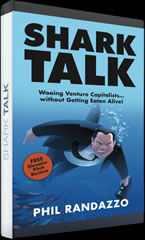 Whether you want to appear on the television show Shark Tank or you just want to figure out how to finance your idea so your dream becomes a reality, Phil Randazzo’s new book Shark Talk: Wooing Venture Capitalists...Without Getting Eaten Alive! will walk you step-by-step through the process of preparing to ask for financing and then what to do once you get it.
Whether you want to appear on the television show Shark Tank or you just want to figure out how to finance your idea so your dream becomes a reality, Phil Randazzo’s new book Shark Talk: Wooing Venture Capitalists...Without Getting Eaten Alive! will walk you step-by-step through the process of preparing to ask for financing and then what to do once you get it.
Phil divides Shark Talk into three sections: “Getting Ready,” “Talking to the Sharks,” and “Now What?” Each section is then broken into a few helpful chapters. Anyone who has watched Shark Tank will know what happens when talking to the sharks, so while Phil has helpful observations in the second part of the book, I think the first and last section are the most valuable because they cover what most people don’t think about when asking for investment money.
To read more, visit Shark Talk.
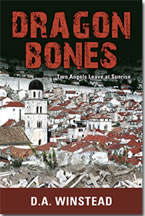 What happens when people do things they shouldn’t? Things so horrible that they are left racked with guilt and longing for redemption?
What happens when people do things they shouldn’t? Things so horrible that they are left racked with guilt and longing for redemption?
Jules Bailey is going to find out in Dragon Bones, the latest paranormal thriller from the pen of D.A. Winstead. Jules is the first character to reappear in one of Winstead’s novels from a previous book. In Wiggle Rooms, Jules helped U.S. diplomat Ted Schwen solve the mystery of what happened to his son who disappeared in Latvia. Now Jules is working in the American embassy in Croatia when the ambassador there sends her on a mission to the old medieval town of Dubrovnik to aid a U.S. senator and his wife in trying to save their daughter.
Against a background of the lingering events of the breakup of Yugoslavia and the resulting wars of twenty years earlier, Dragon Bones explores the need for redemption.
To read more, visit Dragon Bones.
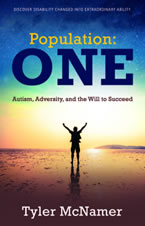 Tyler McNamer’s Population: One is a unique book written by a young man with autism. It is a collection of diverse writings, including creative pieces, autobiography, essays on teenage subjects, and insights into what it is like not only to have autism but to see the world from a different perspective.
Tyler McNamer’s Population: One is a unique book written by a young man with autism. It is a collection of diverse writings, including creative pieces, autobiography, essays on teenage subjects, and insights into what it is like not only to have autism but to see the world from a different perspective.
Early in the book, Tyler describes himself by stating, “I am nineteen years old and have been blessed with autism my entire life. I have chosen to accept my label of autism not as a ‘disability’ but as a ‘unique ability’ and I want to help you overcome the label that you may have suffered from for many years of your life.” As for his book, Tyler states, “this book is not just a book about autism—it is a book about how we can all live together in harmony regardless of our differences” and “Most importantly, you will learn how we can all co‐exist together in harmony as a population of one to make our existence together better, more peaceful, more fulfilling and purposeful.”
To read more, visit Population One.
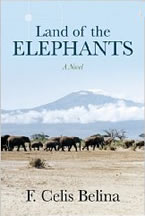 F. Celis Belina’s new novel Land of the Elephants opens in 1961 when four young children survive a mysterious attack in Kenya by presumed poachers or rebels which kills their scientist parents.
F. Celis Belina’s new novel Land of the Elephants opens in 1961 when four young children survive a mysterious attack in Kenya by presumed poachers or rebels which kills their scientist parents.
Eighteen years later, one of the children, Catherine, now an adult, returns to Kenya to study elephants, and hopefully to make contact with one young elephant in particular, Victor. Catherine’s parents had cared for Victor when his mother had died and they had helped him to find a new herd when he was a baby, and Catherine has always wondered what became of him. She returns to Africa as a scientist wanting to study elephants, but she has no idea how her return will also lead her into a chaotic world of crime and killing, or how old friendships will be renewed and answers about her father and friends’ parents’ deaths will finally be discovered.
To read more, visit Land of the Elephants.
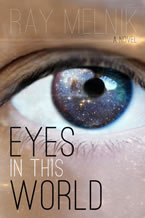 Although I’m not a big reader of science fiction, I appreciate a heartfelt story about real people with real problems, so when I read Ray Melnik’s first novel, The Room, I was instantly hooked. In that book, I also learned about string theory and other fascinating aspects of science that were new to me at the time; it certainly helped me to understand what the characters on The Big Bang Theory were talking about. Without hesitation, I then followed Melnik’s characters through The Room’s sequels: To Your Own Self Be True, Burnished Bridge, and now, the newly published and final volume of this sci-fi tetralogy, Eyes in this World.
Although I’m not a big reader of science fiction, I appreciate a heartfelt story about real people with real problems, so when I read Ray Melnik’s first novel, The Room, I was instantly hooked. In that book, I also learned about string theory and other fascinating aspects of science that were new to me at the time; it certainly helped me to understand what the characters on The Big Bang Theory were talking about. Without hesitation, I then followed Melnik’s characters through The Room’s sequels: To Your Own Self Be True, Burnished Bridge, and now, the newly published and final volume of this sci-fi tetralogy, Eyes in this World.
After a few pages, I was hooked again. And who wouldn’t be when you have characters and situations like Kyle, a scientist who has opened a rift into a parallel universe where he can speak to another Kyle, who is really himself, but whose life is slightly different?
To read more, visit Eyes in this World
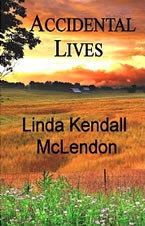 Accidental Lives is the gripping follow-up novel to Linda Kendall McLendon’s Unintended Lies about Catherine DeLong, who leaves her old life after the loss of her husband in a car accident and moves to a ranch in northern Florida. Recently retired agents, Zane and Buck, lure her into haunting questions about her husband’s past while she tries to move on with her life.
Accidental Lives is the gripping follow-up novel to Linda Kendall McLendon’s Unintended Lies about Catherine DeLong, who leaves her old life after the loss of her husband in a car accident and moves to a ranch in northern Florida. Recently retired agents, Zane and Buck, lure her into haunting questions about her husband’s past while she tries to move on with her life.
Zane has his own past to sort out. He has been away from home for decades and feels the urgent need to visit his aging mother and his old friend Parker, who works on his parents’ ranch and was more of a father to him than his own.
Readers will have a lot of surprises in this book, and so will Catherine. I found Accidental Lives a fast-paced read, and never once did my attention lag. It’s the kind of book you read in a day because you can’t put it down, and then you wish it hadn’t ended.
To read more, visit Accidental Lives.

